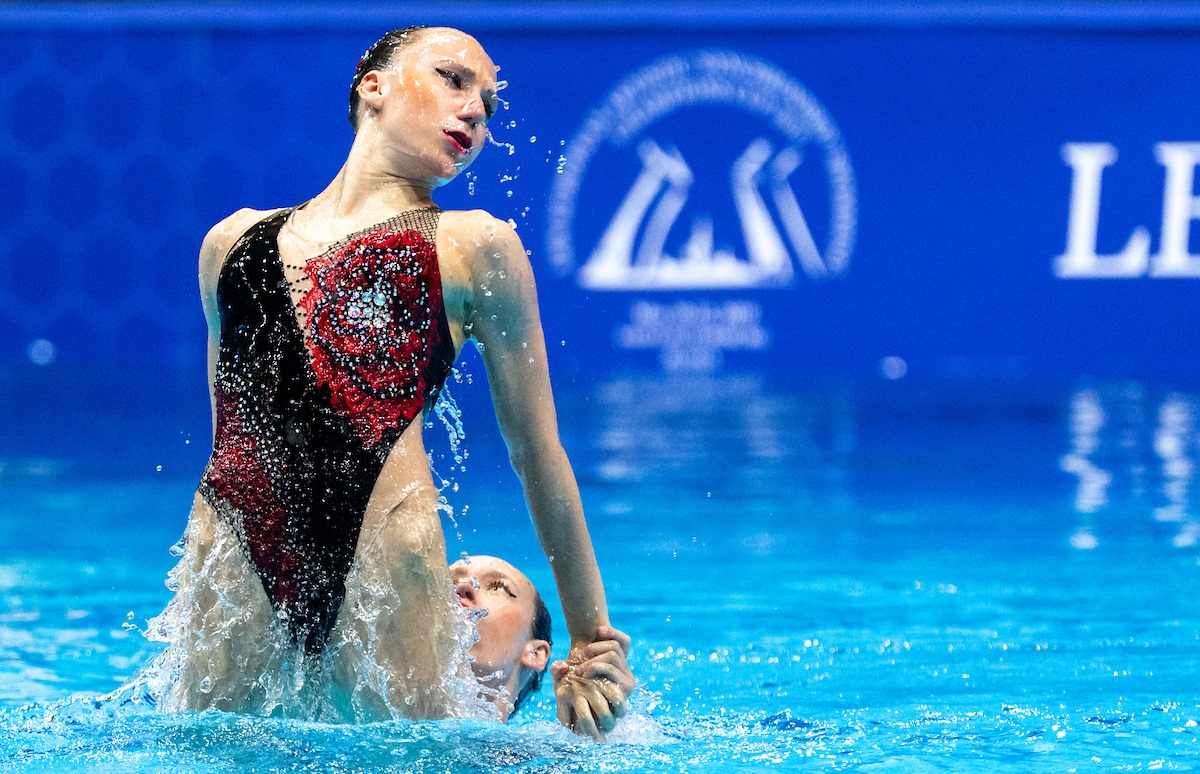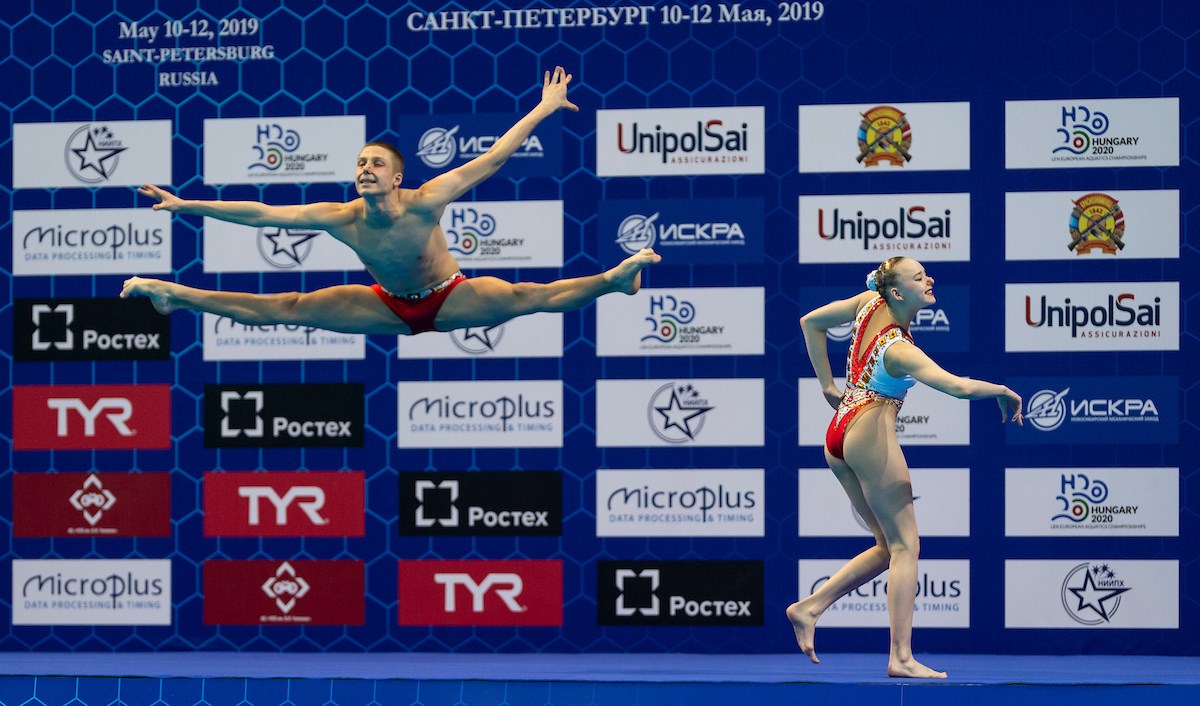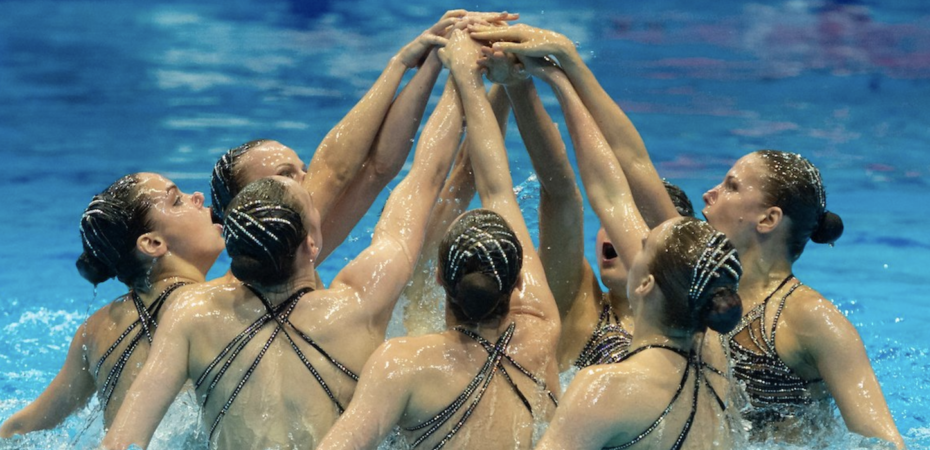To the surprise of absolutely nobody, the Russian team qualified its team and duet to the 2020 Olympic Games in Tokyo in front of a sold-out and electric crowd. The duet from Ukraine also guaranteed itself a ticket to Tokyo by placing second. They are the first nations to join the Japanese team, automatically qualified as host, to the games.
The Russian team dominated the competition, with near-flawless swims across the duet and team events. Svetlana Kolesnichenko and Svetlana Romashina, whose comeback has been outstanding, cruised to the gold medal, and received 97.4667, the best free duet score the country has received since the last Olympics, for their Aliens routine.
The pool was packed for the team events, where the home team performed its ‘Quadrille’ technical routine and ‘Shaman’ free routine. The latter was quite a hit not only with the crowd but also with the judges, with one scoring a perfect 10.0 in artistic impression. The technical team was excellent with a cadence to die for, sharper elements, a similar ending pose for everybody, and it was overall a much better swim than the one in Kazan a few weeks ago. There was not much to take away from the Russians as they clearly displayed excellence. It will be hard to take the gold medal away from them anytime soon.
The free combination was won by what is technically the junior team from Moscow, which could very well become the international junior team, while the St. Petersburg team was the country’s entry in the highlight event, which won silver.
Ukraine was only represented by its duet of Marta Fiedina and Anastasiya Savchuk. They swam their free duet routine for the first time this season. With silver medals in both tech and free and respective scores of 91.6143 and 93.1667, the pair qualified as a duet to Tokyo, which will eventually become a formality as we can safely expect Ukraine to qualify as a team later in the year, which guarantees a duet spot anyways.
Spain medaled in every event it entered but one. It was its first outing of the season in technical team (see below), where it kept its Bollywood routine, and in the technical duet event with Sara Saldana and Paula Ramirez, also with the same James Brown ‘Superbad’ choreography as last season. The elements were rough for the duet, but it was overall a difficult event for many as we’ll discuss later. The free team of ‘Discovering an Island’ was much improved since the Japan Open, with steadier lifts and Saldana being used as the new team flyer. It scored a 91.8667, nearly tying its best score of the quad just like in the tech event. The free duet of Saldana and Ona Carbonell continued to improve and placed only 1.6 points behind the Ukrainians, an encouraging finish heading into the world championships. Finally, the Spanish won the highlight event with its explosive AC/DC routine and a score of 90.8667.
Greece earned bronze medals in both technical and free teams, the only events we saw the nation in.. The Greek had cleaner swims than at their last outing at the Hellas Beetles Cup in early April, and earned 84.7804 in tech and 85.5333 in free. As mentioned in the preview, Italy did not send its top senior team to this meet, and recycled some old routines that we had seen from its top squad the last few seasons. This team however did well, and won silver in the free combination event with the ‘Dolphin’ choreography. The nation ended up placing second in the European Cup rankings behind Russia.
The most-improved nation of this competition was undoubtedly Israel, which has just skyrocketed to the middle of the European pack over the last year and a half. The country earned its first medals ever in a major European competition (Championships or Cup) with bronze in free combination and highlight, and scored its best-score yet in the latter (83.6667). Moreover, it had one of the best swims yet with their new free team routine, scored its best scores in tech (81.4954), and overall continued its climb through the rankings in technical team, free team, and free combination by passing Belarus, a country that was still comfortably ahead at the 2018 European Championships.

Its new duet of Eden Blecher and Shelly Bobritsky also reached new heights with an improvement of 5.5 points in technical duet and of 2.3 in free duet since Glasgow. At the last world championships in 2017, Israel’s duet was very far from looking like a contender to one of the 22 Olympic spots in that event, finishing 27th in tech and 31st in free. With this progression and these scores, a ticket to Tokyo is definitely not out of the question anymore.
Great Britain is making a strong comeback in the team events with a stable roster. It’s great to see the nation climbing back up, especially after witnessing its decline after the 2012 Olympics following funding cuts and retirements. The Brits received here their best scores yet in free team (81.5667) and in free combination (82.9000). They also swam in the technical team for the first time this year for a 77.7891.
As mentioned previously, the technical duet event was unforgiving and rocky for a lot of countries, and the elements scores had interesting and wide ranges at times. Germany‘s Marlene Bojer and Daniela Reinhardt received a zero on their first element, but I unfortunately could not watch the routine, and with no replays it is hard to know what exactly was wrong with it. This made them drop all the way to 18th and a score of 72.7862, while they usually are in the 79-80 range. They got some redemption back at the gala where they performed the start of that same routine, and jokingly stated that it was “time to show we can actually do our first element.”
Bregje and Noortje de Brouwer from the Netherlands also had a tech swim they will want to forget as soon as possible. One of them had a major mistake in the first hybrid and did not finish it, resulting in an automatic 0.5 penalty. The two were probably shaken by this early mistake, and the rest of their swim was immensely affected by it. As we have seen this season time and time again, such a mistake can happen to literally anybody, and if anything it is good to get it out of the way now than at the world championships or worse, the Olympic qualifying tournament. The twins however bounced back extremely well in the free duet finals the next day by reaching 86.0000, a new career-high. This score also meant that they have met the scoring requirements set by the Dutch Federation for an Olympic berth, which was for them to reach 84.5000 or higher in free. With this internal hurdle out of the way, the two can now continue on their journey to qualify to the Olympics.
Nevena Dimitrijevic and Jelena Kontic from Serbia competed for the fourth time in a row, and yet continued to improve on their scores despite the fatigue and the travels. The two qualified the country to its first-ever European final in free duet, where they ended up scoring a career high of 78.3667. Belarus had three different duets lined up in St. Petersburg: its junior duet of Vera Butsel and Hanna Koutsun in free, Vasilina Khandoshka and Valeryia Valasach in tech, alongside Iryna Limanouskaya and Veronika Yesipovich. Khandoshka had been paired with Daria Kulagina at the third and fourth world series meets earlier this season, where they technically represented their club, but she was interestingly swimming here with Valasach, who has been the alternate. There was only 0.14 between the two technical duets, and the junior pair fared decently as well, so it will be interesting to see which route and pairing the nation decides to go for at worlds and eventually the Olympic qualifier.

Russia‘s top mixed pair Aleksandr Maltsev and Maya Gurbanberdieva was forced to withdraw from the meet due to Gurbanberdieva being ill. The home country was still well represented by its junior duet of Kristina Averina and Mikhail Vasilev, which won both tech and free events. Spain‘s Emma Garcia and Pau Ribes earned both silver medals. The two received a 0.5 penalty in their ‘Feeling Good’ technical routine as their opening move was judged as a lift, and a technical routine can only contain one. As penalties were not displayed on the scoring board in the pool, it was too late to file an inquiry by the time the coaches realized what had happened. It was a strange penalty as the routine has not changed all season long, and this move has been in there the whole time without having been penalized before.
Finally, Italy‘s pair of Nicolo Ogliari and Federica Sala won bronze in the free mixed duet event with a ‘Dirty Dancing’ routine (Best. Idea. Ever), an exciting result for the first international outing of this duet. Turkey‘s duet of Gokce Akgun and Ide Ezdi Onal only competed in the free mixed duet event and finished fourth with 73.7667.
The gala at the conclusion of the competition was electrifying, with a roaring crowd, flashing and colorful lights and even a fog machine. The stands were filled, even more so than during the competition, and it came to be standing-room only for the latecomers. It lasted about one hour and a half, and was a fantastic, crowd-friendly experience, where short performances from the athletes were interspersed with a mix of local culture tibdits (ballet and traditional dance) and getting the crowd fired up with famous pop songs and sing alongs.
It was absolutely fantastic to witness such a show of support not only for the home team but for all the competitors, who visibly had just as much fun as the public when performing their show routines, which were ranging from ‘Baby Shark’ in onesies, moustaches drawn in for a Freddy Mercury revival, playing football into the pool, or spinning on a unicorn float in the middle of the pool wearing sunglasses and a flower necklace with the crowd clapping and cheering (I envied you, Finland).
All in all, the Russian federation did a fantastic job organizing, marketing and promoting this competition, and every host nation should aspire to such turnouts and event management. They even had sing-alongs and a dance cam during the competition to keep the crowd entertained while waiting for scores or for the event to begin! NOW this is a sporting event.
Article by Christina Marmet.
Cover photo Deepbluemedia/InsideFoto.

